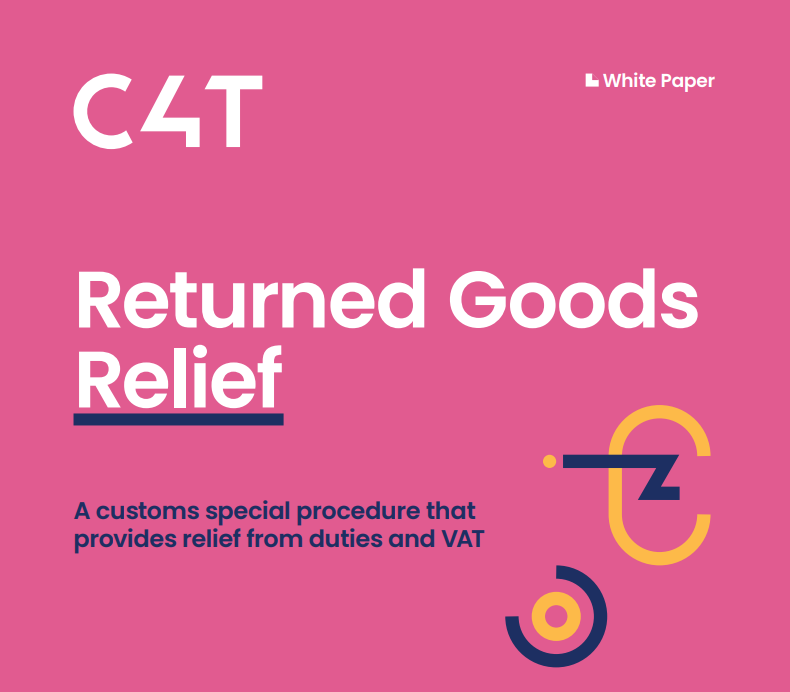Returned Goods Relief (RGR)
What is Returned Goods Relief (RGR)?
Returned Goods Relief (RGR) is a customs procedure that allows goods that were previously exported from a specific territory to be re-imported into that same territory without incurring additional customs duties or taxes.
Under the EU-UK Trade and Cooperation Agreement, goods that are shipped from the EU to the UK, stored in the UK, then re-exported back into the EU are not eligible for preferential treatment, as they do not have UK origin. However, under the Returned Goods Relief procedure, the European Union allows Union goods to be re-imported into the EU without payment of customs duty and value-added tax (VAT).
Do I pay customs duties on returned goods?
When dealing with returned goods, whether or not you need to pay customs duties depends on several factors, particularly the nature of the goods and the documentation you can provide. Avoid paying unnecessary customs duties by claiming Returned Goods Relief.
What goods qualify for Returned Goods Relief?
RGR is available to declarants that can provide documentary evidence that the goods:
-
were originally Union goods that were exported from the customs territory of the Union and returned to Union territory within a period of three years. This period may be extended under special circumstances.
-
are returned in the same state in which they were exported. They cannot have been processed abroad, however the following treatments are allowed:
-
Treatment necessary for repair or to keep the goods in good condition.
-
Handling or treatment which only altered the appearance of the goods.
-
Other treatments done to the goods that were later found to be unsuitable for the intended use of the goods.
-
If the value of your goods at exportation is increased by the treatment while abroad, you will be liable for duty at re-importation based on outward processing rules. However, if you can provide proof that the treatment was both unforeseen and necessary for the goods to be used as intended at export, full relief will be allowed even if the value of the goods has increased.
VAT relief only applies if the goods are re-imported into the EU by the same economic entity that originally exported the goods out of the EU.
Goods that are subject to Sanitary and Phyto-Sanitary (SPS) requirements will be treated as an import from a third country upon return to the Union and will be subject to full import formalities, including risk analysis, examination, and presentation of licenses.
How do I prove the goods originated in the EU?
Documentation must be attached to the outside of the parcel and marked “Customs Documents”. Acceptable documents are:
-
An original or a certified photocopy of the export declaration. Copies of the export declaration must be authenticated by the competent authorities in the exporting EU Member State.
-
The returned goods information sheet (form INF3) issued by the competent authorities in the exporting EU Member State and stamped by customs. This form may be completed by the competent authorities in the Member State when the exporter is aware at the time of export that the goods may be re-imported into the EU.
-
Proof that the goods have not been altered, e.g., by way of your inventory system or other means of tracking the import/storage/re-export from the UK of those goods, must also be provided.
For re-imports to the Republic of Ireland, Irish Revenue has confirmed that the audit trail housed in the CAS Special Procedures module satisfies their requirements to qualify for Returned Goods Relief, as CAS retains a certified copy of the export declaration. Therefore, no INF3 form is required. It is possible that the CAS Special Procedures module will also satisfy RGR requirements for other EU Member States, however in practice it has only been confirmed by the Republic of Ireland.
How to avoid paying VAT on imported goods?
To avoid paying VAT on imported goods, it is crucial to ensure that you meet all requirements for Returned Goods Relief and provide accurate documentation proving the origin of the goods. This can significantly streamline the process and potentially exempt you from VAT on the re-imported goods.

CAS was absolutely key to our client meeting the requirements of the Irish Revenue Commissioners around Returned Goods Relief. We received confirmation from the authorities that the customs audit trail, the electronic access to customs declarations, and the link to batch traceability provided all the documentary proof needed to re-import goods without payment of Customs Duties and VAT.
Ian CusackExplore the benefits of our CAS RGR procedure
In order to qualify for Returned Goods Relief, self-filing is required and all the data must be tracked in one single system, meaning the process cannot be executed by a customs broker. To take advantage of this opportunity for duty and VAT savings, you will require a digital platform like CAS to automate the process and produce the proof customs authorities require to grant preference.
CAS supports the RGR procedure end-to-end, from export from the EU, import/export to and from the UK, and import back into the EU.
Qualify for Returned Goods Relief with CAS
CAS links your original export declaration with your import declaration, maintaining an audit trail of the movement of goods from the EU to the UK and back to the EU, complete with detailed flows, documentation, and time stamps. A certified export declaration and proof of exit are also housed in CAS and linked to the declarations, supplying the proof needed to qualify for RGR. As products are linked to the import and export MRNs in CAS, they can be traced by batch, providing an audit trail.
CAS is connected to the relevant customs system in the respective country for declarations filing.
-
Export declarations are uploaded and processed in CAS for shipments from EU plants to GB
-
CAS immediately produces the import declarations in the UK using the preferential treatment for those goods that are supported by proof of preferential origin
-
INF3 documents are requested from the customs offices of export
-
The obtained INF3 documents can be uploaded as PDFs in CAS
-
The INF3 reference number is manually added to the export declarations
-
For each shipment from GB to the EU, export declarations are processed in CAS
-
CAS automatically retrieves the export declaration references and INF3 references and produces the import declarations with RGR procedure in the EU
Get Started!
Avoid paying unnecessary customs duty and VAT on re-imported goods. CAS allows for fast onboarding so you can start taking advantage of RGR as soon as possible, without the need for a customs warehouse authorisation or the requirement for stock segregation.
Using our APIs, you simply execute a one-time CAS implementation and you will be automatically integrated with multiple countries and their customs systems. CAS is a single-platform solution for all your customs management needs. Contact one of our experts today to help you get started right away.
Frequently asked questions
Do you have more questions about Returned Goods Relief? Here are answers to the most common inquiries we get.
No. Under the Returned Goods Relief (RGR) procedure, you generally don't need to pay duty on returned goods. RGR allows goods previously exported to be re-imported without extra customs duties, provided you meet certain conditions and provide the required documentation.
The specific Customs Procedure Code (CPC) for Returned Goods Relief (RGR) can vary depending on the country's customs regulations. In the United Kingdom, the relevant CPC is often labelled as 40 00 C08. However, these codes can change, so it's important to refer to your country's customs authority or documentation to ensure you're using the correct code for your re-importation under RGR.
Using the wrong CPC (Customs Procedure Code) can lead to incorrect customs processing. It's crucial to use the accurate CPC for your situation. If the wrong one is used, it might result in delays, incorrect duty assessments, o non-compliance with customs regulations. Always ensure you're using the correct CPC to avoid complications during customs procedures.
The meaning of the Returned Goods Relief (RGR) process is to allow goods previously exported from a territory to be re-imported without additional customs duties or taxes, provided they meet specific conditions. This customs procedure facilitates the smooth return of exported goods, ensuring no extra charges upon re-entry.
Save up to 80% on customs administration
Drive down costs, manage local, regional, and worldwide customs and speed up turnaround times for UK and European importers and exporters. All within one single platform.

